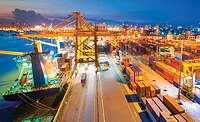Report illustrates severity of COVID-19 impact on global supply chains

Results from a new, independently conducted survey released by Interos, found that more than 90% of companies expect the disruption of global supply chains caused by the pandemic will have long-lasting effects on their businesses.
Nearly every one of the 450-senior decision-makers in the United States who took the survey (98%) said their organization’s supply chain was disrupted. Their organizations grappled with shortages, demand reduction, price swings, and other upheaval in their supply chains due to the pandemic. More than 90% are concerned that future waves of infections will have similar consequences.
Some industries experienced more upheaval than others. The survey found that 65% of supply chains in aerospace and defense, on average, were disrupted by the pandemic. The biggest issues in the industry are the collapse of suppliers (cited by 48% of industry respondents) and supplier bankruptcies (46%).
Out of a list of 11 risk factors covered in the report, 57% of organizations ranked the ongoing pandemic as the biggest current risk to their supply chain, a greater percentage than any other risk listed. Questions further in the survey help quantify just how severe the disruption has been. Respondents estimate that on average about 43% of their entire supply chain suffered some kind of interruption, ranging from:
- Fluctuations in supplier prices (cited by 44% of respondents)
- Safety restrictions causing orders to be paused or slow to fill (44%)
- Need to find suppliers in other geographic regions due to import/export restrictions (36%)
- Bankruptcy of suppliers (25%)
To reduce risk and protect against future shocks, businesses are planning to retool their supply chains, the survey finds. Among the steps they are considering is moving manufacturing to the United States. They also wholeheartedly agree (97%) that better visibility into their suppliers is imperative, but lack a streamlined and comprehensive source -- less than half (44%) currently have a single solution for monitoring their entire supply chain, including sub-tier suppliers. However, it's become an industry standard -- 91% agree that a streamlined way to continuously monitor the entire supply chain for risks would have helped their supply chain to be more resilient against the disruption caused by the pandemic.
“The ongoing COVID-19 pandemic dealt an unprecedented shock to supply chains, and our survey shows that it remains a threat to operational stability,” said Jennifer Bisceglie, CEO and Founder of Interos. “Organizations have begun to realize the importance of continuously monitoring their suppliers for risks and disruptions, but more can be done.”
Risk of further disruption in focus
The pandemic exposed the vulnerabilities of many organizations, especially those that heavily rely on China for raw materials or finished products. Nearly half of respondents (45%) said they are susceptible to regional or geographic concentration. Other vulnerabilities include:
- Inadequate planning for long-term disruption (48% of respondents)
- Single point dependencies or bottlenecks (43%)
- Lack of understanding of the interrelationships with global supply chains (38%)
The aerospace and defense industry, in particular, comes up short on planning for short-term disruptions (cited by 60% of industry respondents) and knowledge of interrelationships with global suppliers (60%).
COVID-19 puts weaknesses in the spotlight
The survey also asked respondents about other risks to their supply chains beyond the pandemic. The top five are cyber threats/data breaches (41%), issues related to doing business in restricted or sanctioned countries (34%), supplier liquidity (33%), and reliance on a single supplier or country (30%).
As companies apply digital technologies to more aspects of their supply chain, they become more vulnerable to cyberattacks and data breaches. One-third of respondents said they are also concerned about cyberattacks on their direct suppliers, and 32% said they are concerned about cyberattacks on sub-tier suppliers.
Taking action to mitigate risk
In such a challenging environment, the most forward-thinking businesses are not wasting time addressing vulnerabilities in their supply chains. Many respondents (98%) are planning to take some kind of action to build resilience against future disruptions – and the top courses of action are identifying and employing alternative suppliers, continuous monitoring, and increasing onshoring capabilities.
The risks posed by geographically-dispersed supply chains led almost three quarters of respondents to reply that there will be a slight to major increase in onshoring in the near-term, with over 75% predicting this will continue in the long term as well. Respondents in manufacturing, aerospace and defense, and the oil and gas industries were more aligned with the possibility of more onshoring than the overall response. The pandemic, however, poses a major obstacle to retooling supply chains, the survey finds. Lack of budget, regulations, and contractual obligations are also big reasons holding companies back from implementing significant changes.
Looking for a reprint of this article?
From high-res PDFs to custom plaques, order your copy today!







